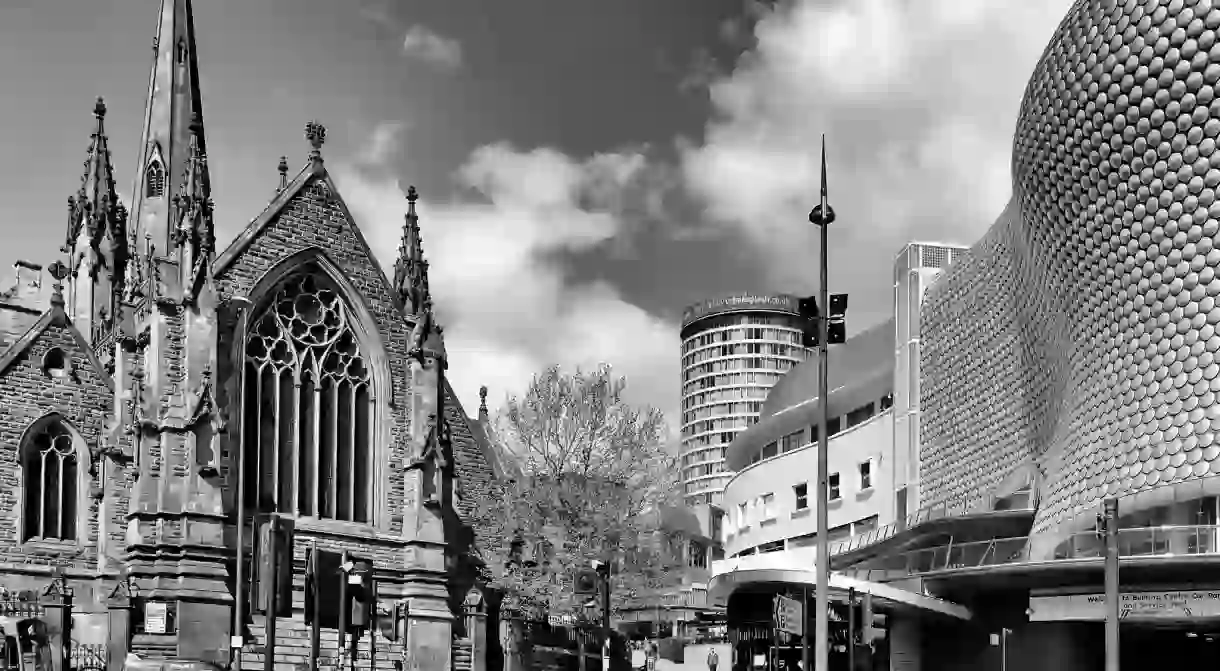A Walking Tour of Birmingham's Architectural Landmarks

A city of heritage, industrialism, and progress, Birmingham is full of rich and varied architectural landmarks. This quick and easy walking tour gives you a small selection of the sights to see.
New Street Railway Station
This tour starts at Birmingham New Street Railway Station, a landmark in its own right. The station, which was once voted the second biggest eyesore in the country due to its sub-surface 1960s architecture, was completely redeveloped between 2010 and 2015. The new station features a massive concourse topped with an iconic domed atrium at the centre, which gives the station its airy feel. The domes themselves are made of ETFE cushions, the same material used to construct the Eden Project in Cornwall. The mirrored façade, envisioned as an “embodiment of the flows that go through the station”, reflects the surrounding shops and buildings and envelops the “media eyes” mounted over the entrances.

Bulling Shopping Centre and St Martin in the Bullring
Next stop is the Bullring Shopping Centre, and its neighbor St Martins Church. The shopping centre is made up of two buildings, the East Mall and the West Mall, connected by an underground passageway. The balustrades in the east mall feature colourful glass “jewels” embedded within the metalwork, while Selfridges, on the far side of the West Mall, is clad in over fifteen-thousand shiny aluminium discs. This feature has won eight awards, including the RIBA Award for Architecture 2004 and Destination of the Year Retail Week Awards 2004. The church of St Martin in the Bull Ring provides stark contrast, a Grade II listed building in the Neo-Gothic style. The church features many beautiful stained glass windows, including a Burne-Jones window made by William Morris in 1875. This feature is the oldest remaining window; in April 1941, it was taken down for safekeeping, and one day later, a World War II bomb exploded outside the church, destroying all the other windows.

Birmingham Cathedral
An unmissable landmark is Birmingham Cathedral, situated in what is known to locals as “Pigeon Park”. The oldest building in the city that is still used for its original purpose, Birmingham Cathedral was designed by Warwickshire man Thomas Archer and is a rare example of English Baroque Architecture. The surrounding courtyard is home to a number of listed monuments, including the Unett Monument, the Angel fountain, the Burnaby obelisk and a bronze statue of Bishop Charles Gore the first Bishop of Birmingham.

Birmingham Town Hall
Birmingham Town Hall has been a hub of civic and cultural life in Birmingham for over 180 years. An impressive example of Roman Revival civic architecture, the design of the building was based on the Roman Temple of Castor and Pollux. Joseph Aloyisus Hansom, better known as the creator of the famous Hansom cab, designed the building, which served as home to the CBSO between 1926 and 1991. Birmingham’s famous Iron Man sculpture also sits just outside of the Town Hall.

Hall of Memory
Our tour ends with some quiet reflection at the Hall of Memory. Opened in 1925, the building stands as a memorial as the citizens of Birmingham who gave their lives in WWI, WWII, and in active service since. It was built of Portland Stone by Birmingham craftsmen and is surrounded by four granite pedestals. Atop each pedestal stands a large bronze statue by local artist Albert Toft, one each to represent the Army, Navy, Air Force and Women’s Services.














